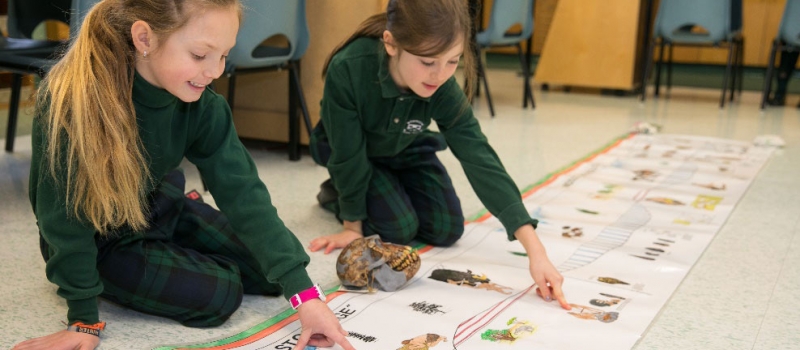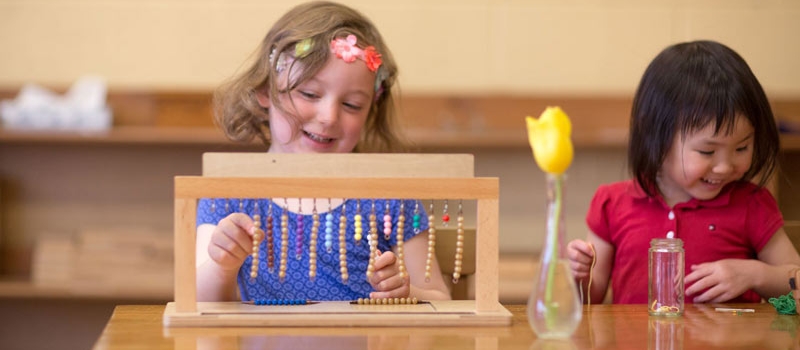The advantage that lasts a lifetime
Montessori education
CCMA school administrators are supported through the accreditation process to guide their school, staff, children and parents in an optimal manner. They benefit from the expertise of the collaborative professional community to help deliver excellent Montessori education.
The CCMA categories are as follows:
Accredited School
A school that has applied for Accreditation and successfully completed the rigorous, 12 to 18-month Accreditation process is called an Accredited school. The school must be in operation for more than 3 years before the process can take place.
The school’s commitment to successfully meeting Accreditation criteria and ongoing improvement and accountability is reviewed annually in the membership form. A new, short Annual Report back to the CCMA Board will also ensure this standard.
Accreditation is for a period of five years. At the end of 3 ½ years from the original date, the school will begin the process toward their next visit. CCMA offers support to guide the school through the process.
Applicant School
Joining the CCMA as a member school is the first step in working toward Accreditation. Once a school applies and is welcomed to membership, the school is an Applicant School.
Upon application, an applicant school can begin to use the CCMA applicant logo to demonstrate to families that the school is committed to the accreditation process and aims to provide students with high quality, authentic Montessori education.
New Montessori schools’ programs must be 3 years old before they complete the accreditation process. Applicant schools with established programs may not need to wait for three years to become accredited.
Affiliated School
An Affiliated school is a school that has met the criteria to participate and is part of the CCMA community. The school is not engaged with the CCMA Accreditation process.
Teacher Training Institute Member
Montessori Teacher Training Institutes offer programs for adults to realize and understand the Montessori philosophy and pedagogy and inspire them as they put it into practice.
Teacher Training Institute Members offer varied age programs that are Accredited by AMI or MACTE or any other training as approved by the Council.
Alumni Member
An Alumni member has formerly been the school head, administrative director or faculty head in a CCMA Accredited school.
An Alumni member has helped lead a school through an Accreditation process but is no longer working in a school community.
CCMA Member Benefits
- Standard of excellence
- A community of Montessori schools
- Professional support
- Ongoing professional development for administrators and staff
- Public recognition of program excellence
- Shared marketing opportunities
- Brand enhancement of your school
- Ensuring program quality for your students
- Models of self -reflection for school improvement
What is Accreditation?

The primary objective of an accreditation is to make good schools better. It also helps to establish some consistency of standards, preserving the Montessori philosophy and spirit of Montessori education. It helps schools be accountable to each other, parents and the community. Self-reflection is a professional benefit when undertaken with a commitment to self-improvement. Schools that have completed a CCMA reflection will find that a spirit of enquiry develops in the whole school concerning its Montessori values and plans for the future. It also helps to ensure that a school has its policies and practices well documented.
Accreditation gives us a unified voice when we speak with government policy makers (agencies) with regards to consistency of standards, as well as to recognize and support our basic principles.
Everyone benefits collectively, individually, and professionally.
Why Become an Accredited School
An accreditation is the process that leads a school to become an accredited member of CCMA. It involves a compilation of school policies and documents and a self-reflection by the school, through the completion of a series of questionnaires followed by an on-site visit by at least two CCMA visiting team members. The visiting team members prepare a written report of their findings and recommend that the school be accredited or that certain requirements must be met before a school is accredited. Schools that receive their accreditation are presented with a certificate of accreditation and are permitted to identify themselves as CCMA accredited schools. A response to the report will be issued by the school to CCMA within one year. Accredited schools are re-evaluated every five years. Applicant schools must be Accredited by their third year of membership.
Who is Eligible for Accreditation

Licensing Requirement
It is critical before any application that all appropriate licensing and any provincial or territorial requirements for child care programs or schools to operate, are in place. Evidence of such will be required in all documentation.
All schools applying for Accreditation must meet the following criteria for each of their Toddler, Casa and Elementary Montessori classes:
The Montessori Non-Negotiables
- Are guided by the educational philosophy of Dr. Maria Montessori.
- Have one teacher in each classroom who holds an age-appropriate diploma
from an AMI or MACTE accredited teacher training institute or any other teacher training program that may be recognized by CCMA. - Have a Full range of Montessori materials in each classroom as recommended by CCMA, which offers the broad curriculum to allow for sequential learning.
- Have an uninterrupted work cycle, that is ‘age and stage’ appropriate (e.g. range from 1 to 2 hours for Toddler; 2 to 3 hours for Casa; 2 ½ to 3 hours for Elementary), to allow for the development of focus.
- Recordkeeping including: tracking, lesson planning, record of child’s work in progress, and weekly anecdotal notes on each child.
- Have a policy of admitting children to the program at the appropriate age level consistent with Montessori principles that follow the developmental stages and sensitive periods for learning.
- Have multi-age groupings in each classroom (with a span of 1 year or more in the Toddler classroom and 3 years in the Casa and Elementary classrooms), which supports the concept that learning is a social process.
- Require attendance 5 days a week, for consistency in learning, with consideration for a phase-in period for Toddler.
- Abide by the CCMA Code of Ethics.
How to Get Accredited

Why Get Accredited
Accreditation is meaningful to various stakeholders in different ways:
- Accreditation assures the public of your commitment to Dr. Montessori’s vision and your commitment to children.
- Accreditation is about transparency and accountability. Accreditation confirms that your school is succeeding at doing what it has promised to do – to provide high fidelity Montessori education.
- The reflective nature of the process helps faculty members refine their practice and in turn better meet the needs of their students.
- Accreditation continues to provide regulators the confidence that your program is consistent with world-renowned Montessori education and meets all provincial / territorial requirements.
Accreditation Process
What is the Accreditation Process?
Before the Visit
1. The school administration or designates must attend a required Accreditation meeting.
2. A verbal or written confirmation that the school meets the requirements is obtained by the CCMA office.
3. The Request for Accreditation Form is sent out to the school along with the Consent, Acknowledgment, and Release Form.
4. The forms are returned to the CCMA office for the process to continue.
5. The Accreditation Guidelines are sent to the school.
6. The Executive Director and the CCMA office assign the Visiting Team Members to the school. The school is invited to request a visiting team member from the list. At least one visiting team member will have training at the level(s) being accredited and a minimum of two visiting team members will be assigned to all schools, and more will be added as needed, according to the size or the number of campuses of the school.
7. The Executive Director and the CCMA office confirm the accreditation team with the school and verify the date of the visit with the school administration.
8. The CCMA office sends the following out to the school:
a) Reflection Booklets.
b) Accreditation Guidelines Booklet.
c) List of assigned Visiting Team Members’ mail and E-mail addresses, telephone numbers and date the binder/USB key, etc. are due.
d) The Essential Qualities and Learning Outcomes of Montessori Education document to present to staff.
e) Examples of Schedules for the Day of the Accreditation Visit.
f) The invoice for the balance of the Accreditation fee.
9. The visiting team members sign a Confidentiality Agreement in order to ensure privacy for the visiting school, before reading any documentation.
10. The fee to become accredited is tied to membership and is available by contacting the CCMA office. It is paid once every five years.
11. Prior to the visit, the school should contact the visiting team members to arrange accommodation if necessary. If there is any travel, hotel accommodation, or meal expenses (during travel), incurred by the visiting team, they are to be paid directly by the school. Current CCMA reimbursement for travel is 45 cents per kilometer.
12. The school teaching staff and administration complete the reflection questionnaires. The school compiles and copies all required documents as listed in Appendix 1, as well as the reflection booklets, and makes a complete binder or digital format for each visiting team member.
13. The school sends a copy of the binder or USB stick or on-line format or a combination, and the observation schedule of the day of the visit to each visiting team member at least six weeks before the accreditation date and confirms to the CCMA office that this has been done.
14. A copy of the schedule for the day of the visit must also be sent to the CCMA office.
15. Approximately one week prior to the visit, a conference call between the designated visiting team members, CCMA ED and school administration will be arranged. The first half of the call will be an opportunity for the visiting team to discuss any items that have come up through the document review, and to determine in advance who will write which portion of the report. The second half of the conference call will include the administrator(s) of the school, to review any last-minute details about the visit, and discuss anything of importance that is going on at the school that the school would like the team to know in advance. This call should last no more than one hour.
16. The Accreditation visit takes place on the confirmed date or dates.
17. After the visiting team members have conferred, a discussion highlighting the observations, strengths and recommendations and requirements are shared with the administrator.
18. The outcome will be shared with the school at the end of the visit.
19. A draft report is prepared by the Accreditation Team Leader for the Executive Director and the CCMA office within four weeks of the visit, with a recommendation to the board that:
a) to be granted accreditation.
b) to be granted accreditation at a later date, once the requirements are met.
This decision must be based on specific reasons which involve demonstrable deviation from Best Practices, demonstrable inadequacy of disclosure of purposes or program, or significant inconsistency between the stated mission of the school and the program as observed by the visiting team.
c) if the requirements are not met with one year then accreditation will not be granted.
d) the Board votes on the proposed Accreditation Status and the report is sent to the school within 8 weeks of the school visit.
20. On the day of visit, the team lead organizes the return of one binder to the CCMA office and ensures that the other binder/s is left at the school.
21. If the school is recommended for Accreditation:
a) the Executive Director and the Director of Accreditation sign the Visiting Team Members’ report.
b) the CCMA Board is informed and votes to accept the recommendation for this Accreditation or acknowledges the recommendation for a follow-up visit.
c) a certificate, signed by the Chair of the Board, is issued to the school.
d) An Annual Statement of any significant changes within the school is required in the Membership Renewal Application
e) a Follow-Up Response by the school to the Accreditation Process is currently being designed.
22. If there are requirements for accreditation to be granted at a later
date:
a) the school has one year to remedy the situation.
b) the school will complete a Follow-Up Visit Report to answer and confirm how the requirements have been met and comment on any of the recommendations.
c) the Executive Director and at least one team member will make a follow-up visit within that one-year period, to determine if the requirements have been fulfilled.
d) if the school disagrees with the Visiting Team’s decision, the school may appeal within two months to the CCMA Board of Directors.
How to Apply
Please contact the CCMA office for more information.



